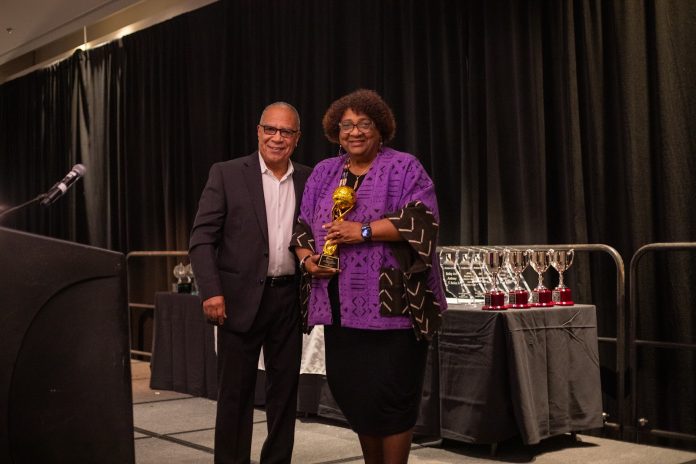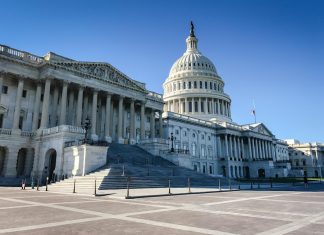To help boost small businesses, the California Black Chamber of Commerce organized the 28th annual Economic Business Summit on Nov. 7 at the DoubleTree by Hilton.
This year’s theme centered on the chamber’s new “Build Scale Grow” program, an initiative designed to equip small business owners with the tools, technology, and confidence to compete in an ever-evolving economy. The day also included a focused session on how to bid on Caltrans and DGS projects and concluded with an awards dinner featuring a keynote by California Secretary of State Dr. Shirley N. Weber.
“At the California Black Chamber of Commerce, our mission is clear — to serve as the leading voice and trusted resource for small business owners from every community,” said Jay King, chamber president and CEO. “We are dedicated to ensuring that small businesses are not only heard but are positioned at the center of California’s economic growth and prosperity.”
However, behind the event’s energy lies a deeper story about history, inequity, and restoration. During segregation, Black communities were often excluded from white-owned banks, property ownership, and government support. Out of necessity, they developed self-reliant economies, including barbershops, insurance companies, theaters, and restaurants, which kept money circulating within the community.
In neighborhoods like Tulsa, Oklahoma’s Greenwood District, dubbed Black Wall Street, and Durham’s Hayti, a single dollar would pass through dozens of Black hands before leaving the community. That circulation created wealth, but also independence and pride.

“When we were segregated, our dollar circulated in our community up to 100 times,” King said. “What we’re doing now is reclaiming that same economic power through knowledge and capacity.”
Then came the 1921 Tulsa Race Massacre, federal redlining policies, and urban renewal projects that bulldozed Black business districts across the country; the infrastructure of Black prosperity was systematically dismantled. In California, the first Black-governed town of Allensworth, founded in 1908 by Col. Allen Allensworth as a model of self-sufficiency, was also slowly undermined by discriminatory water policies and economic neglect.
King explained that the economic setbacks Black businesses face today are rooted in deliberate systemic barriers.
“Our government was purposeful in destroying the foundation of Black business,” he said. “Now we’re being purposeful in rebuilding it.”
For King, rebuilding begins with modernizing how Black-owned businesses operate.
“We’re a decade behind in technology, and two decades behind in AI,” he said. “That’s what we’re trying to close with the Build Scale Grow program, helping small businesses not just survive, but scale.”
Weber’s speech traced her journey from growing up under segregation to holding one of the state’s highest offices. Her remarks drew a direct line between the personal and the political.
“I began to understand just how cruel life had been to Black people,” Weber said. “How things were rigged against us in getting contracts — all the rules were written to keep us out.”
Weber, who is California’s first Black secretary of state, is helping to remove those barriers by expanding access to information, resources, and registration support for minority entrepreneurs.
“Always be prepared. We know our diversity is our strength,” she said. “We don’t give up because our ancestors never gave up. We continue to rise in spite of the challenges we face.”
She encouraged the audience to stand up for what they believe in and be strong-willed.
“We have to be the humanitarians, the fighters and educators,” she said. “Everything is taken from us lately, even food. Are you as strong as your ancestors? It’s not the time to get weak-kneed and confused. It’s time to stand up for what we believe in.”
Chamber CEO Angela Lowe sees the program as a way to transform everyday skill into sustainable enterprise.
“We have gifts, we bake, we design, we fix cars, but we don’t always know how to do the admin work,” Lowe said. “Stop calling your business a hustle. Legitimize it. Get your EIN [employer identification number], get your business structure. So, when a crisis hits, you’ll be ready.”
Lowe’s message underscored one of the chamber’s core goals: helping small business owners formalize and protect their work.
“Formalization gives access to contracts, to loans, to recognition. That’s what changes lives,” she added.

Among those recognized at the summit was Shawn Raiford, founder of SRE Transportation Services, which provides rides for seniors and people with disabilities. His company’s 18 vans represent years of commitment and community focus.
“Where else do we hear about little companies like mine?” Raiford said. “This summit helps us get seen. It makes us feel like what we do matters.”
For Raiford, recognition from the chamber is validation for hundreds of small businesses across the state that keep their communities moving, often quietly and without a spotlight.
The Economic Business Summit served as a reminder that the story of Black entrepreneurship is not one of deficit, but of resilience and reinvention.
“We have to build scalability and capacity,” said King. “Because 96% of our businesses are sole proprietors making less than $100,000 a year. That means we have so much room for growth. When we grow, we don’t just change our community, and we change the economy.”
Trailblazer: Sen. Angelique Ashby, Megan VanVoorhis, Dr. Ramona Bishop, Lasha Smith-Boyden, Dr. LaTesha Watson, Allen Warren, Neville Boston
Small Business Area Awards, California: Clovis — Bailey Ave.; Sacramento — Fiji Fusion, Tap Wine Lounge, SRE Transportation
Central California: Fresno — Business Lyfe Balance Inc.
Southern California: Rancho Cucamonga — AliVon Enterprise LLC Business Consulting Agency
Chamber Affiliate of the Year: African American Chamber of Commerce of San Joaquin
Community Service “Change Maker”: Lynette Hall, Jevon Wilkes, Kindra Montgomery-Block, Mikel Davila
Community Activist: Najee Ali
Humanitarian Award: Dr. Shirley N. Weber
Legend in Media: Lady Charmaine Bassett, Wanda Smith, Courtney Dempsey
President’s Appreciation: Ingrid DeVore, George Jones, Dr. Tara Lynn Gray, Lori Banales
Heroes Recognition: Mitchell Leach II
Top Partner: Amazon, StubHub, Tri Counties Bank, Wells Fargo
Paul Petrovich Humanitarian Impact Award: Kabul Singh





